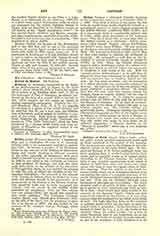

Arthur, JAMES (DIDACUS ARTURUS), a Dominican friar, and a theologian of note, b. at Limerick, Ireland, early in the seventeenth century; d. (probably) 1670. He became a member of the Dominican Order in the convent of St. Stephen at Salamanca, Spain, and taught theology in different convents of his order, especially at Salamanca, with great credit to himself and profit to his numerous students. In 1640 he was called to the University of Coimbra as first professor of theology, and held this chair until 1642, when, on the occasion of the separation of Portugal from Spain, he was expelled for refusing to take the oath to defend the doctrine of the Immaculate Conception. He returned to the convent of St. Dominic in Lisbon, where he resided for many years and devoted himself to the preparation of a commentary on the Summa of St. Thomas Aquinas. The projected work was to have comprised ten volumes, but the death of the learned writer prevented its completion. Only the first volume was ever printed (1655); the second was completed and never published. The Dominican historiographers Quetif and Echard give February, 1644, as the date of his death, but the consensus of opinion is in favor of 1670. He was buried in the convent of St. Dominic, Lisbon, Portugal, where he died.
A. C. O’NEIL

